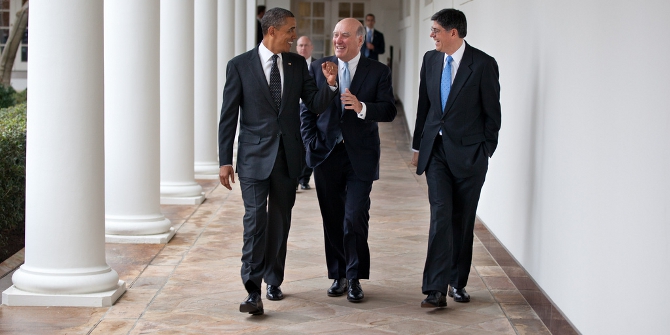 Last week saw an insurrection at the US Capitol which has been linked to President Trump’s aggressive rhetoric around the 2020 election result. In this Q&A, LSE US Centre Director Professor Peter Trubowitz writes that the best option for the country is for Democrats is to pursue President Trump’s impeachment with an allied goal of convincing Republicans to agree to a bipartisan commission to investigate the causes of the January 6 Capitol insurrection.
Last week saw an insurrection at the US Capitol which has been linked to President Trump’s aggressive rhetoric around the 2020 election result. In this Q&A, LSE US Centre Director Professor Peter Trubowitz writes that the best option for the country is for Democrats is to pursue President Trump’s impeachment with an allied goal of convincing Republicans to agree to a bipartisan commission to investigate the causes of the January 6 Capitol insurrection.
What are Congress’ options if Vice President Mike Pence is unwilling to invoke the 25th amendment to remove President Trump from office?
If Pence won’t go down the path of the 25th, then it seems to me that the only option available to Democratic Speaker Nancy Pelosi is to have the House impeach Trump. Censure is weak and tying it to the 14th amendment (which prohibits an elected official from holding office if they have “engaged in insurrection or rebellion against” the US) may not be as clear-cut as Bruce Ackerman and Gerard Magliocca argue in the Washington Post today. The Wall Street Journal is pointing to the legal and constitutional issues it raises and they are not alone — Laurence Tribe of Harvard University has also questioned the legal viability of using the 14th amendment. Presumably, Pelosi has explored this option and ruled it out, perhaps because the Senate needs to be in session to vote on it and because she thinks it important to lay down a marker before Biden is inaugurated on January 20. Trump’s behavior may not meet the Brandenburg test (which determines whether inflammatory speech advocating illegal action can be restricted), as Brent Stephens pointed out yesterday, but there is no ambiguity about it being an impeachable offense. Impeachment seems the cleanest, most straightforward path forward.
Won’t impeaching Trump simply inflame tensions further in an already polarised political environment?
The argument that voting to impeach will further inflame the situation strikes me as problematic. The same could be said to be true about not doing so. Failing to impeach will also lower the bar, yet again, about what constitutes acceptable, and unacceptable, behavior in American democracy. Meanwhile, I think it is wishful to think that opting not to impeach will improve soon to be President Biden’s chances of getting Republican “buy in.” This argument rests on a flawed view of how bipartisanship is achieved. You don’t get there with an olive branch or in this case, turning a blind eye to malfeasance. You get there the old-fashioned American way by advancing policy issues in the legislative and electoral arenas that are designed to divide your opponents (best practice is with a high-minded argument, a big smile, and a wedge issue). This is the way it has been since the creation of political parties in America. E.E. Schattschneider, Walter Dean Burnham, and others have written eloquently about this American method of engineering change. If there is going to be a new beginning (I’m all for that), Biden will have to advance policies that peel off the more reasonable elements of the Republican Party. I think that is doable, but that’s a story for another time.

“Impeach Trump Rally Mt. Prospect Illinois 6-15-19_1121” by Charles Edward Miller is licensed under CC BY SA 2.0.
What should President-elect Biden do now?
Biden in true bipartisan spirit, should quietly hang the possibility of a Senate impeachment trial over Republicans’ heads to get Republican Leader, Mitch McConnell and others to agree to something along the lines of the Warren Commission or perhaps, the September 11 Commission — authorizing this is a much easier vote for them to make. The Commission’s charge would be to get to the bottom of what led to the events of January 6 (including Trump’s role before and since the November election), and it would have the authority to propose wide-ranging reforms to ensure the peaceful transition of power going forward. Whether Biden should publicly call for this, or have it come from Democratic and Republican leaders, is a tactical question and can be argued either way. The main thing is that such a commission will move this matter off Biden’s plate and importantly, out of his administration’s purview, while providing a real opportunity to fix some things that are clearly broken. It would also make investigating “what happened” more credible to Americans (not all, to be sure) who might otherwise view such an investigation as deeply partisan. Some thought would have to be given to membership on the commission to maximize public confidence in its findings, but this is manageable.
Please read our comments policy before commenting
Note: This article gives the views of the author, and not the position of USAPP– American Politics and Policy, nor of the London School of Economics.
Shortened URL for this post: https://bit.ly/2Xzm2y0
About the author
 Peter Trubowitz – LSE US Centre
Peter Trubowitz – LSE US Centre
Peter Trubowitz is Professor of International Relations, and Director of the LSE’s US Centre. His main research interests are in the fields of international security and comparative foreign policy, with special focus on American grand strategy and foreign policy. He also writes and comments frequently on US party politics and elections and how they shape and are shaped by America’s changing place in the world.







Dear LSE Community,
There is much controversy on the Impeachment trial here in the United States, However, the case is predicate, or brought, as upon two law cases – that are used to impeach or punish, Judges. This means that a President cannot be impeached upon cases referring to the impeachment of Judges – the constitutional separation of powers. A Judge is not a President and a President is not a Judge.
As such, the United States Senators may not vote yea or nay. To vote destroys the Separation and independence of the American Judicial System. Chief Roberts has already declared this impeachment illegal.
Here is the way out. The trial can conclude upon asking the Judicial system to make interesting, rich, local, and informed Judgements from the Courts; so powerful and wise that the ratios and legal reasoning are more interesting than the Media. Otherwise, it is the media, unelected, that will govern us, and nothing else.
I prefer Chief Justice Roberts and interesting, colorful, wise, and well-meaning Court Judgements. In America, a Judge is not a President and a President is not a Judge. Our legal findings can certainly compete with the Media.One very powerful American said this morning = convict Trump or we will damage the legal system – but as you know from Chief Roberts, any yea or nay simply hurts all of us. Better to make the lawyers and Judges do theirpart in rebuilding our communities.